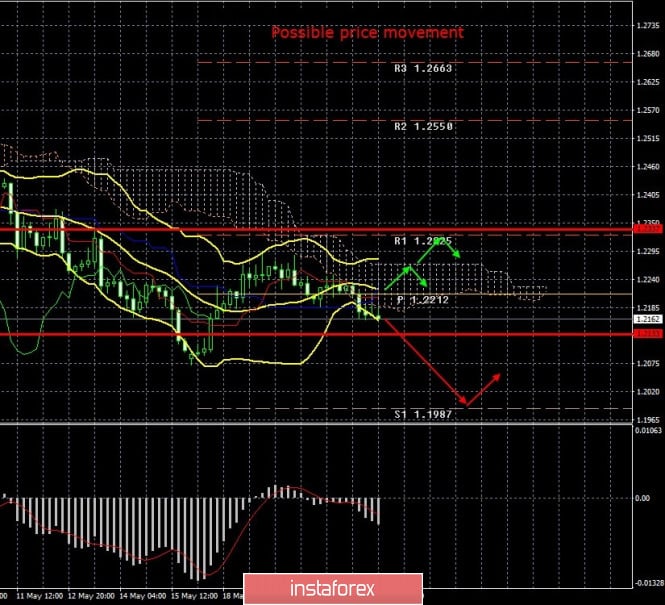
The British pound continues to experience self-inflicted market pressure against the US dollar. We have repeatedly noted that if the EUR/USD pair is trading in the side channel and this is logical and justified by technical reasons and a common fundamental background, then the British currency is not in demand due to the huge number of problems that the UK has already encountered and will certainly face in the near future. In the euro/dollar article, we noted how important the issue of choosing a government is, because the life of the country and its citizens in the coming years will depend on it, and the consequences of the government's mistakes can be seen for a decade. So, we recall that Boris Johnson won the election at the end of last year, when the British did not care who to vote for, if only the saga with Brexit ended quickly. As it turns out six months later, this was not the wisest decision of the British. The person who won the post of prime minister is not the person who thinks for the future, who very carefully and responsibly approaches every step and decision, won the "mini copy of Donald Trump" in the British version. That is, the promises and loud statements of Johnson really made him believe that he was able to withdraw the country from the EU after three years of failure. However, at what cost? The British pound has become cheaper against the dollar since 2014, and over the past three years has accelerated the pace of decline. The UK economy is losing a hundred billion pounds annually "thanks" to Brexit, and the absence of a trade and general agreement with the European Union puts London, not Brussels, in the first place, uncomfortable. The European Union is not even considered in this article. Even if both the EU and Britain suffer from a lack of agreement, the British economy will suffer again in addition to all previous falls and problems. And in comparison with the dollar, the pound will continue to fall, since the only problem in the US is caused by the pandemic, and in the UK - the crisis, Brexit and the absence of trade agreements.
Thus, the situation for the British pound will simply not change either in recent months, or even in recent years. Obviously, not a single currency can continuously fall. Therefore, the British currency also has periods of growth, which usually end in a new and stronger fall. Formally, negotiations with Brussels continue, but at the beginning of this year we repeatedly focused our readers' attention on the fact that it took 7-8 years for the European Union to conclude agreements similar in scope and scale with Canada or Australia. Thus, those ten months that Johnson had allotted for negotiations from the very beginning fueled, if not laughter, then skepticism. As you can see now, all the skeptics were right. Three rounds of negotiations were completed, and the parties did not advance in resolving key issues and differences. Experts stick with their opinion: the parties will not be able to come to an agreement either on July 1 or December 31.
Alex De Ruyter, a professor at the University of Birmingham, also, like many, believes that there will be no deal. "I do not think that there are chances to conclude an agreement before the end of 2020. It took Canada nine years to negotiate a free trade agreement with the EU and Japan. In our case, we have a country - not a member of the EU with an economy that is closely integrated with the European one. It will take years to resolve all legal issues related to this integration. And if you listen to the opinion of Michel Barnier, then at least three years," said the professor. The professor also believes that the option with the absence of a deal is the most probable, however, there are still low chances to extend the "transition period". De Ruyter also points out that key issues to come to an agreement on are fisheries in British waters, labor law, the judiciary and environmental standards. Many EU countries simply will not agree to an option in which their fishing vessels do not gain access to British waters. Therefore, London needs to make concessions. "I'm not convinced that the British government wants to make a deal: for ultra-right Brexit supporters who insist on an open market, Brexit itself has always been what was used to achieve a different regulatory environment from the EU. For them, I think, a break without an agreement would be preferable," says de Ruyter. As for the forecasts, Professor Birmingham believes that an agreement with the European Union like the Canadians will still bring London losses by 6%, the absence of an agreement - a loss of 9% of GDP. "If we take into account the problems caused by COVID-19, then all this is likely to destroy the British industrial production and agriculture," the professor said.
Thus, the prospects for the pound remain far from bright. There will be virtually no major macroeconomic events and news in the UK next week. The calendar of macroeconomic events for the UK is completely empty. Thus, traders can only pay attention to data from the United States, which will not be too much next week. However, the macroeconomic background now in any case continues to be ignored by traders. We can say that only a general fundamental background now has some significance. And he, as we have already figured out, remains not in favor of the pound. Thus, the technical picture now reflects a downward trend, which coincides with the fundamental background. Over the past week, traders were unable to adjust the pound/dollar pair even to the upper border of the Ichimoku cloud. Thus, buyers now have practically no strength. So, the likelihood of continuing the downward track is extremely high. Over the next several weeks or months, we believe that the pair may fall to March 20 lows at around $1.14.

In technical terms, the pair resumed the downward movement, as evidenced by all indicators of both trading systems, the Ichimoku (consolidating below the critical line) and linear regression channels (overcoming the moving average). Therefore, the highest that the pound can count on is just correctional growth. The potential for its fall is almost unlimited. The most likely target is the March 20 low at 1.1411.
Recommendations for the pair GBP/USD:
As the pound/dollar continues a new downward trend, we recommend that we continue to sell the British currency, using mainly the 4-hour timeframe. Volatility remains the same, about 100-130 points per day, there are no signs of a new panic. The first goals for short positions are levels 1.2085 and 1.1985.
The material has been provided by InstaForex Company - www.instaforex.com